Can SIBO cause acid reflux? What’s the deal with acid reflux anyways?
I decided to finally get this post ready for you after posting THIS graphic on Instagram from Dr. Mark Hyman –> How to Soothe the Gut from Acid Reflux.
BTW – from Dr. Mark Hyman’s graphic, we have: Break Down (digestive enzymes), Gut Support (l-glutamine) + Move Now (magnesium glycinate) in our supplement line at Your Best Gut Healing Supplements.
Can SIBO Cause Acid Reflux (+All About Acid Reflux)
Click HERE to save this post for later.
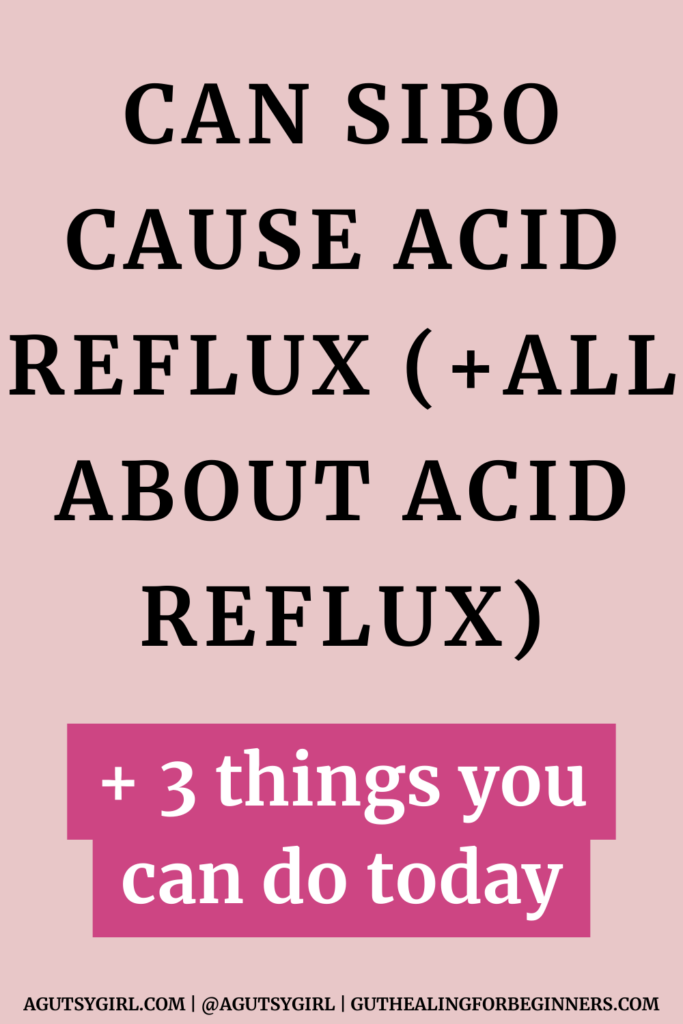
What is SIBO
First, in case you’re new ‘ round here, let’s chat SIBO.
SIBO (small intestinal bacterial overgrowth) in the most simplistic terms is a condition where there is more bacteria in the small intestine than should be.
Despite the arguments over “good” vs “bad” bacteria, it’s not really either.
It’s simply that more bacteria is in the small intestine than should be and thus causes everything from digestive symptoms like gas, bloating and diarrhea to gut-related symptoms like brain fog, headaches, skin issues, respiratory symptoms, a compromised immune system, nutritional deficiencies, and more.
What we want is more bacteria in the large intestine; not small. This is how we flourish.
With small intestine bacterial overgrowth there is simply an overgrowth of bacteria in the small intestine.
SIBO Symptoms
But don’t let the “small” intestine fool you into thinking this is a small problem.
The small intestine is the place where 90% of nutrient absorption occurs. And this is huge.
Because the small intestine plays such a vital role in the digestive system, when you have SIBO it causes a variety of symptoms.
My most telling symptom was that it felt like something was “feasting” in my upper stomach constantly.
When it got really bad, I’d hear rumbling and I’d feel absolutely famished 24/7. No amount of food could satisfy the hunger pangs I’d get.
Once the feasting, rumbling feeling settled, it would drop to my lower stomach and I’d feel bloated (and crabby and more crabby and just blah).
You might not feel what I felt in particular, but other symptoms can include things like:
- bloating
- diarrhea
- constipation
- pain
- B12 deficiency
- rashes
- fatigue
- food sensitivities
- headaches
- acne
- IC (Ileocecal) valve protrusion
- all of the above (ugh, the dickens!)
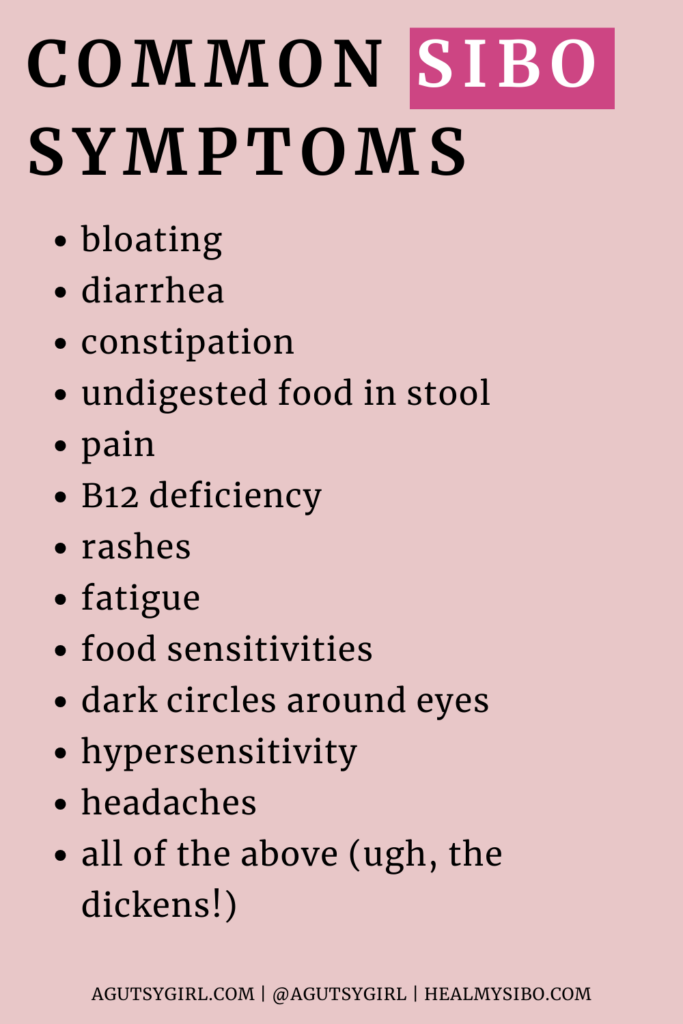
And while acid reflux might not make the most common symptoms of SIBO, let’s dive into the idea that SIBO can cause acid reflux.
What is Acid Reflux?
First, the basics.
Acid reflux is a condition in which acidic gastric fluid flows backward into the esophagus, resulting in heartburn (i.e. acid flowing backwards instead of forwards as it should).
For those of you who are visual, here is a great representation from Prevention Magazine.
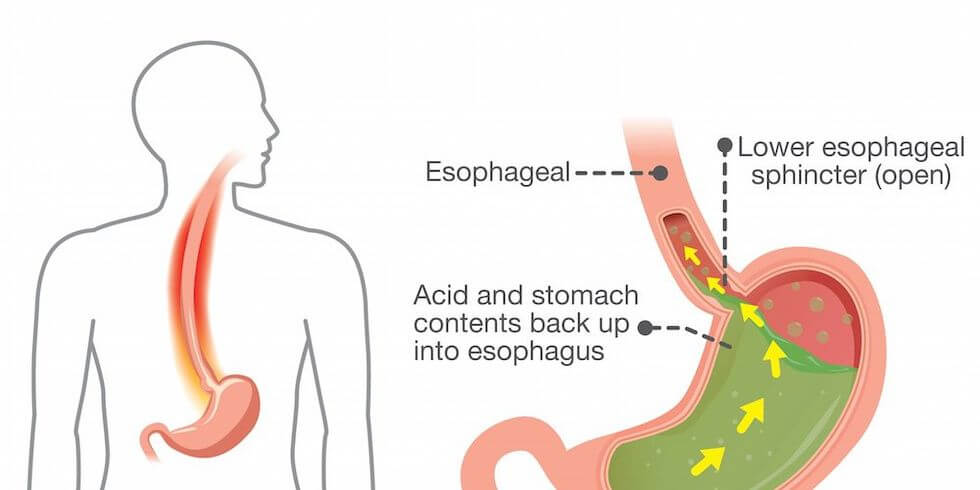
Its most common symptom is heartburn, and though people use the terms acid reflux and GERD interchangeably, they are not technically the same things.
Gurd?
Some people think it’s gurd. It’s not. It is GERD.
GERD is what acid reflux progresses to, if it worsens. It stands for Gastroesophageal reflux disease.
Though we might not think of acid reflux as anything too serious, it absolutely can become serious if not dealt with.
Having it can put you at risk for more serious problems, such as ulcers and esophageal cancer.
Acid Reflux Symptoms
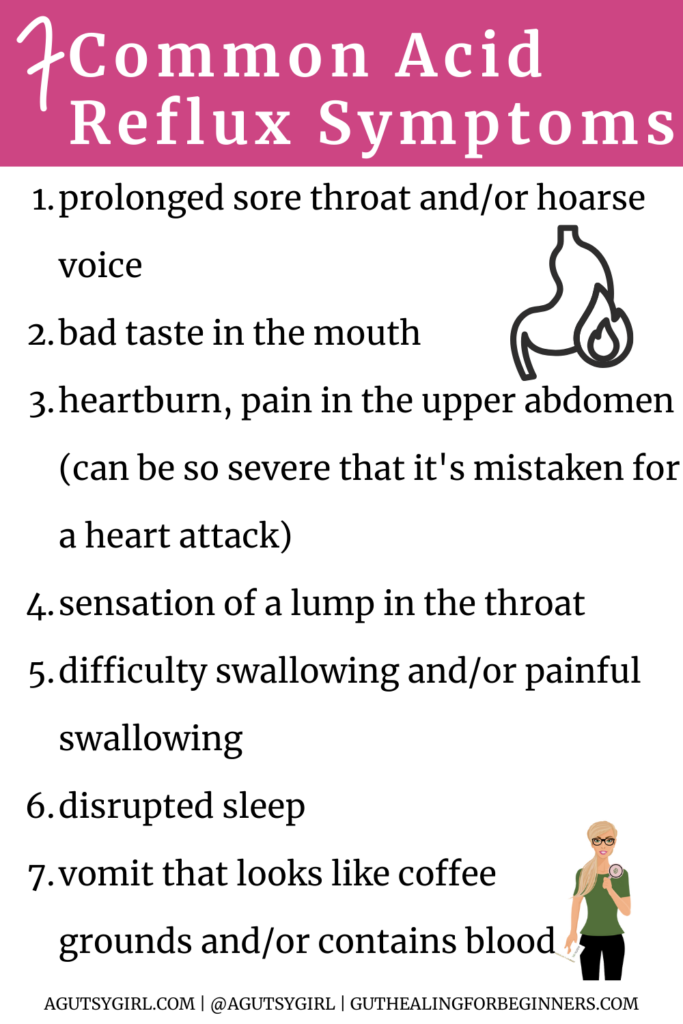
Like everything else, there is not a definitive set of symptoms, but here are some common symptoms of acid reflux:
- prolonged sore throat and/or hoarse voice
- bad taste in the mouth
- heartburn, pain in the upper abdomen (can be so severe that it’s mistaken for a heart attack)
- sensation of a lump in the throat
- difficulty swallowing and/or painful swallowing
- disrupted sleep
- vomit that looks like coffee grounds and/or contains blood
What Causes Acid Reflux?
The two main causes of acid reflux include:
- hiatal hernia
- weakness / dysfunction of the valve called the lower esophageal sphincter
No, being pregnant is not a cause of acid reflux. If you’re pregnant, you might just be more prone to experiencing it due to extra pressure on the abdomen and stomach.
More root causes to consider include:
- Inflammation because it causes tissue damage and dysfunction in the esophagus
- Carbohydrate malabsorption
- Underdeveloped digestive system. (See below: Acid Reflux and Children)
- Magnesium deficiency
- Aging
By the way, the BEST way to know which foods will and will not cause you troubles is to keep meticulous track.
It is the precise reason why I created the 28-day gut healing journaling SYSTEM. If you don’t want the spiral-bound hard-copy version, I also offer an instant downloadable PDF version HERE.
The SIBO + Acid Reflux Connection
So then how about SIBO?
While you may not hear it talked about as often and acid reflux may not be the primary cause of SIBO, there is a connection between SIBO and then the trickle down effect to having acid reflux as well.
Here is various research that has proven the connection:
- The Functional Gut Clinic found in a study: “The study retrospectively looked at a group of patients who were being reviewed for antireflux surgery because their symptoms of reflux were unresponsive to medications. A large proportion of them – around 60% – had intestinal dysbiosis diagnosed by hydrogen and methane breath testing (HMBT). These patients were more likely to report troublesome belching and abdominal bloating.”
- RefluxUK states: In our experience SIBO is most frequently associated with Laryngo-Pharyngeal (LPR) / silent reflux symptoms. Belching of an aerosol of stomach contents up into the oesophagus and to the throat can cause a sore throat, post-nasal drip, throat clearing, a sensation of a lump in the throat (globus), voice problems as well as others.
- Verywell Health states: Dr. Robillard’s theory is that the gas produced by the bacteria residing in the small intestine puts enough pressure on the small intestine and stomach that it can push the acid from the stomach into the esophagus.
- The NIH states: Prior to antireflux surgery, most patients with symptoms of gastroesophageal reflux disease (GERD) have been taking long-term proton pump inhibitors (PPIs). PPIs have been shown to cause changes to the intestinal microbiota, such as small intestinal bacterial overgrowth (SIBO), which is characterised by symptoms of gas bloating. Patients undergoing antireflux surgery are not routinely screened for SIBO, yet many patients experience gas-related symptoms postoperatively.
The list could go on and on, but I think you get the point.
Stomach Acid
Mostly, the connection between SIBO and acid reflux is the stomach acid factor.
We know that having low amounts of stomach acid contributex to so many digestive disorders, including SIBO. In fact, it’s typically a main factor in why people cannot get rid of stubborn SIBO, why their symptoms keep recurring.
And with acid reflux, sometimes it’s actually the case that one has too little (not too much) stomach acid.
Regardless, the traditional “solution” for reflux includes things like acid blockers or acid reducers, and long term PPI use (proton pump inhibitors). But what this acid-blocking medication does is further decrease the amount of acid you are producing.
It’s a vicious cycle that keeps the various digestive conditions – like Reflux and SIBO – in a constant state.
So what should you do?
- First, determine for certain that you do, in fact, have both acid reflux and SIBO.
- Then, understand your underlying causes:
- You will need to know what the root cause for your SIBO is AND
- Why the acid reflux is there
- Finally, if your healthcare provider has, in fact, told you that have low stomach acid as an underlying cause then address it ASAP. IF you’re certain that the reflux is NOT due to too much stomach acid, you can do my at home hydrochloric acid test which you’ll find HERE.
Additional Ways to Soothe the Gut with Reflux
In addition to the graphic above from Dr. Mark Hyman, here are some more ideas:
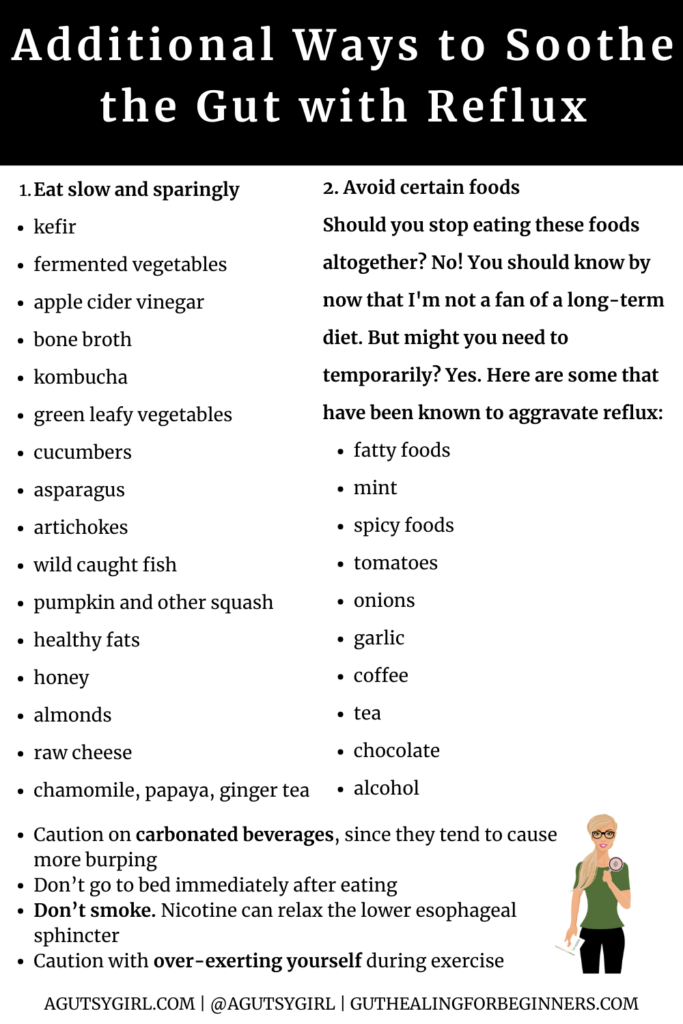
Eat Slowly and Sparingly
- Foods that can help:
- kefir
- fermented vegetables
- apple cider vinegar
- bone broth
- kombucha
- green leafy vegetables
- cucumbers
- asparagus
- artichokes
- wild caught fish
- pumpkin and other squash
- healthy fats
- honey
- almonds
- raw cheese
- chamomile, papaya, ginger tea
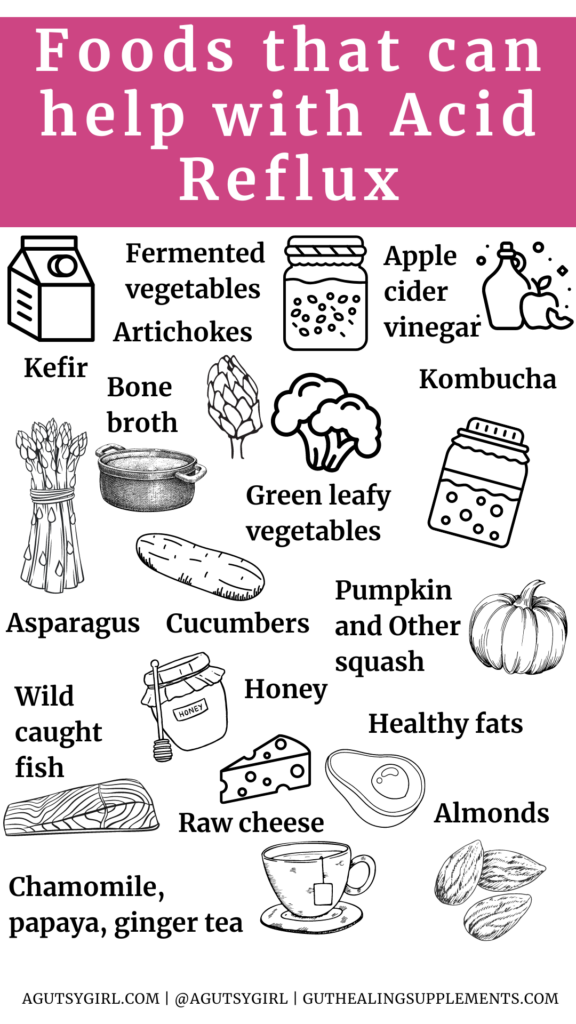
Avoid Certain Foods
Should you stop eating these foods altogether? No! You should know by now that I’m not a fan of a long-term diet. But might you need to temporarily? Yes. Here are some that have been known to aggravate reflux:
- fatty foods
- mint (p.s. Remember in A Gutsy Girl’s Bible when I mentioned this caution for reflux and peppermint tea?!)
- spicy foods
- tomatoes
- onions
- garlic
- coffee
- tea
- chocolate
- alcohol
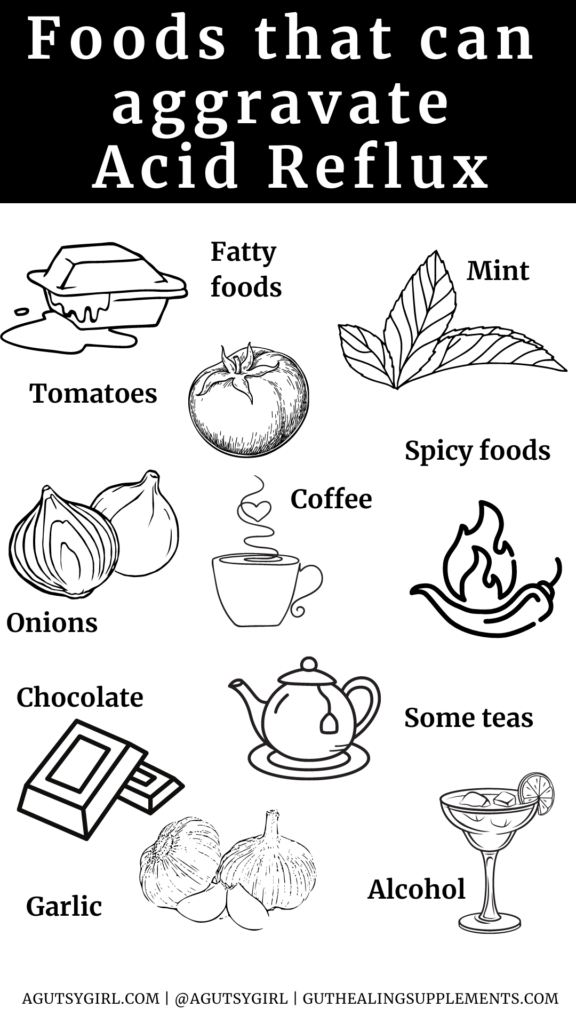
Caution on carbonated beverages, since they tend to cause more burping
Don’t go to bed immediately after eating
Don’t smoke
Along with every other reason ever given, nicotine can relax the lower esophageal sphincter.
Caution with over-exerting yourself during exercise
Engaging in too much exercise, too often can produce these uncomfortable symptoms (for both SIBO and reflux).
Ultimately, it will just act as another form of chronic stress, which also prohibits healing.
Lose weight
I put this one last because I hate to have to even mention it.
The truth, though, is that being overweight or pregnant can also trigger heartburn due to added pressure on the abdomen and stomach.
What is Silent Reflux?
Now that I have gone over acid reflux and some signs and symptoms of it, the question always comes up,
So then what is silent reflux?
It’s acid reflux that’s “silent” in the sense that the cause/effect is there, but you don’t show symptoms.
Silent reflux is also known as Laryngopharyngeal Reflux (LPR).
According to the Cleveland Clinic, the ways for treating silent reflux are in line with how acid reflux is treated.
So then how would you know if you had silent reflux?
You might not, until you start having more severe symptoms from the damage caused by your stomach acid.
Silent Reflux Symptoms
However, mild symptoms that could present themselves look like:
- hoarseness
- sore or burning throat
- trouble swallowing
- the feeling that you constantly need to clear your throat
If you are starting to feel some of these symptoms pop up more frequently, it’s something to check out.
What you don’t want is for it to begin showing full-blown symptoms because the reversal process then will be far more complex and take much longer.
What is a PPI?
A PPI is a proton-pump inhibitor. Its intended use is to reduce the amount of acid made in the stomach. Commonly prescribed PPI medications include rabeprazole (Aciphex), esomeprazole (Nexium), lansoprazole (Prevacid), omeprazole (Prilosec), and pantoprazole (Protonix).
While I believe that some might need the PPI to control symptoms, I also know that when used long-term there can be consequences.
According to this,
Medications may cause new or worsened symptoms, depending on how your body reacts to them. If you’ve been relying on over-the-counter and/or prescriptions to ease pain and discomfort, you might be familiar with some of the notorious side effects associated with their use, which include headaches, muscle cramps, rapid heart rate and more digestive upset.
Additionally, and I believe this is the most important factor to consider – sometimes (many times) doctor’s will say the heartburn you are experiencing is from too much stomach acid, give you a PPI, and leave you on your merry way when the reality might be that you have too little stomach acid. (Which I talked about above.)
The PPI will only decrease the amount of stomach acid you have and in that situation you will also have more digestive upset.
Can you wean off PPI use?
If and when one is committed to doing the various diet and lifestyle changes, weaning off PPI’s can absolutely happen.
Do I think it can always happen, for everyone, no matter what? No.
And do I think you should start weaning on your own? Even more of a no.
Use caution, proceed slowly, and do this in conjunction with your doctor or other practitioner.
What if You’re Pregnant
First, I’ve never been pregnant, so I have no idea what reflux and pregnancy would be like. In this case, I am not the face of you, my Gutsy friend!
That said, acid reflux during pregnancy is very common. If I were pregnant and experiencing it, I would do all the additional soothing ways as mentioned above plus wear loose-fitting clothing (duh!), and chew even more on my Chimes Ginger candies (I swear by these for an upset stomach).
How to Sleep When You Have Acid Reflux
Someone asked, “Is it necessary to sleep with head elevated?”
According to a Harvard article,
Ideally, your head should be 6 to 8 inches higher than your feet. You can achieve this by using “extra-tall” bed risers on the legs supporting the head of your bed. If your sleeping partner objects to this change, try using a foam wedge support for your upper body. Don’t try to create a wedge by stacking pillows. They won’t provide the uniform support you need.
My answer would be – first sleep however you wish to sleep. If that doesn’t work, do as they recommend with your head elevated or another tried-and-true method.
Acid Reflux and Children
I do know something about this, as Samarah had pretty bad reflux as a baby.
At the time, she was in foster care so we didn’t have a choice but to put her on omeprazole as the doctor recommended.
As it was mentioned above, this can happen in children with an underdeveloped digestive system. Samarah was born just shy of 27 weeks, so that was definitely our answer. I didn’t only do the omeprazole, though. I also did Colic Calm and bone broth.
She didn’t stay on the omeprazole forever; weaned off fairly quickly.
If your child is older, in addition to the causes above, other reasons can include:
- previous esophageal surgery
- having a severe developmental delay or neurological condition, such as cerebral palsy
Is Ginger Good for Acid Reflux
Many use ginger for acid reflux.
Whether or not it’s “good for you” depends on one thing – you.
However, as it relates to ginger for acid reflux, here is what I want to mention:
- Did you know you can make homemade Ginger tea that’s actually super incredible?! My aunt taught it to me. Warm up water then drop in 2-3 of the Chimes Ginger candies. Sip and enjoy.
- There has been a lot of chatter around digestive enzymes. I’ve written about them in depth HERE.
- DGL tablets
Article sources: HERE, HERE, HERE, HERE, HERE, HERE, HERE, and HERE.
Gut Healing: ELEVATED
If it has, and if you want to dig in deeper, I’m inviting you to join Gut Healing: ELEVATED.
This is a 30-day PROCESS. It’s the FRAMEWORK and a detailed outline for what to do, day-by-day for 30 days to learn everything you can not only about the gut, but about how you will apply it for YOU and your own journey.
It’s my decade+ – long journey wrapped in one package with everything I learned, how I healed, and the SYSTEM that got me from there to here.

This was me THEN: bloated, gassy, sick
This is me TODAY: no bloat, healthy, thriving

My ONE goal with A Gutsy Girl is to make sure YOU, too, heal your gut and heal your life.
If you liked this post, you might also enjoy:
Xox,
SKH
🤰 bloating be gone! weight loss through optimal gut health for women
💃ʜᴇᴀʟ ʏᴏᴜʀ ɢᴜᴛ. ʜᴇᴀʟ ʏᴏᴜʀ ʟɪfe.
🫶🏻 founder gutbyome.com

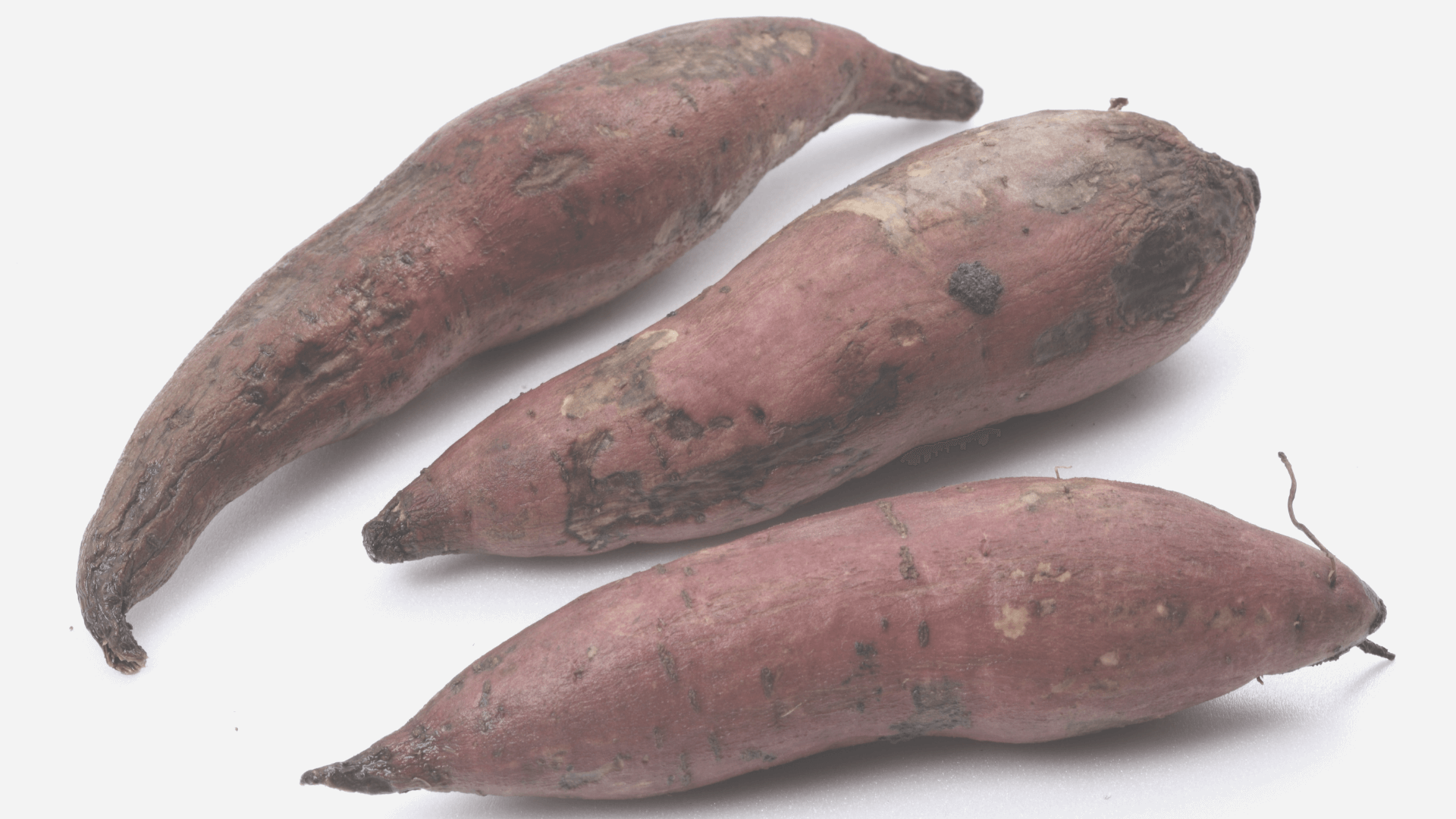
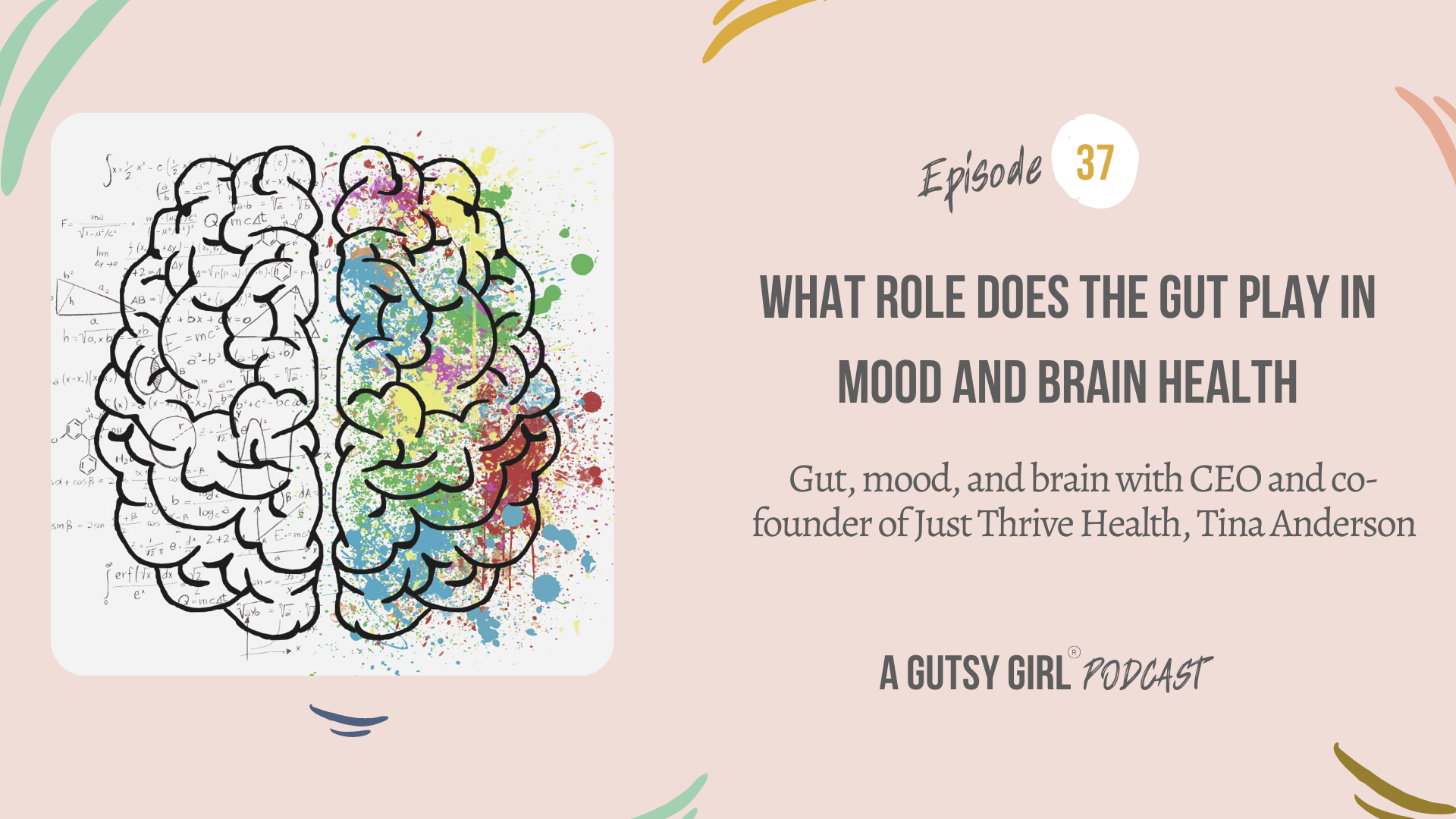


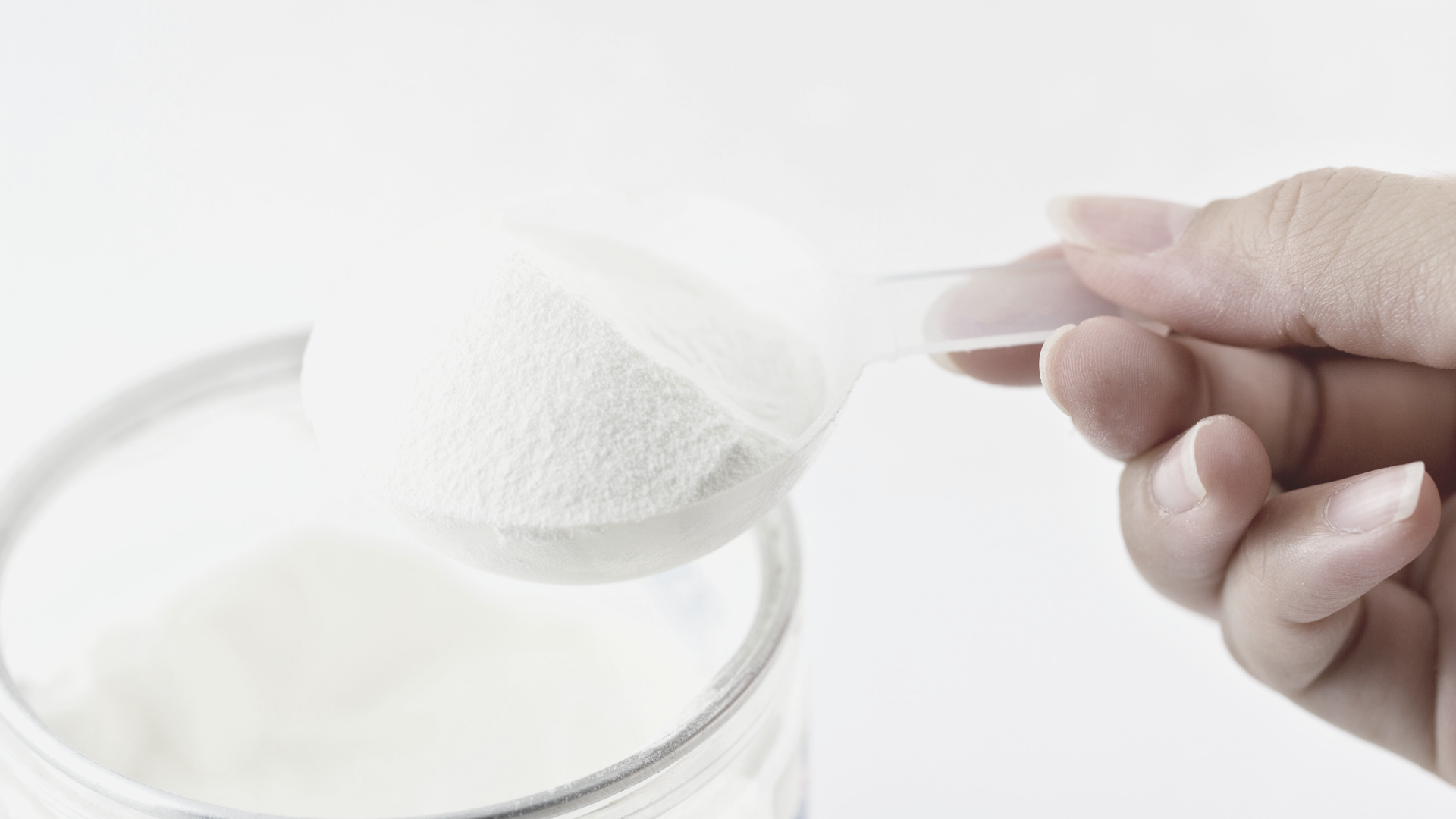

Glad you wrote this! My daughter was recently put on prilosec for ongoing reflux but we know part of the cause is erosion of the lower esophageal sphincter you mentioned (found via upper GI scope). GE/GI doctor suspects she has had reflux for some time combined with anxiety to exacerbate things (wish I had listened to my intuition long ago and insisted with the pediatrician that she was not just constipated and in need of Miralax.) It’s only been a week but I’m hopeful that things seem to be improving. And hopefully the sphincter will heal and she can wean off the medicine.
Looking forward to more info about the digestive enzymes. I wanted to give them to my daughter before we finally saw a GE, but the pedi was hesitant. And none have dosing for children listed.
How do you know if your acid reflex is from low or high acid?